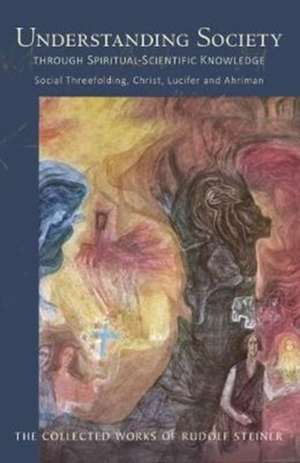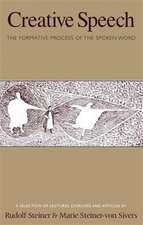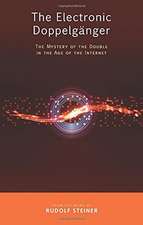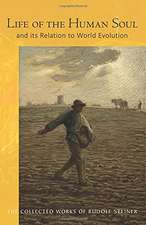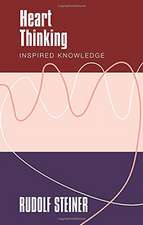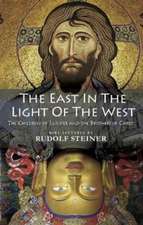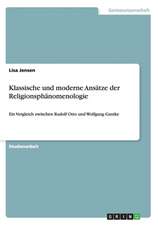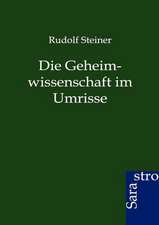Understanding Society Through Spiritual-Scientific Knowledge: The Collected Works of Rudolf Steiner
Autor Rudolf Steiner Traducere de Matthew Bartonen Limba Engleză Paperback – 22 dec 2017
In the uncertainty following World War I, Rudolf Steiner perceived a unique opportunity to establish a healthy social and political constitution. He began lecturing throughout post-war Germany, often to large audiences, about his social ideas. Here, speaking to a more intimate grouping at the Goetheanum in Dornach, Switzerland, Steiner seeks to deepen the themes of social threefolding, showing specifically how new social thinking is integral to anthroposophy.
Steiner speaks of the superficiality of the materialistic view of history, originating with the economic shift amongst the population at the time of the Reformation. Back during the Egyptian-Chaldean era, initiates ruled out of spiritual impulses. Later, in the Greco-Roman period, priests had power over their congregations. Today, homo economicus (the economic human) has become the dominant idea, while capitalists and bankers take control. But the healing of social relationships can come about only through a different mode of thought; the life of spirit must be separated not only from politics but also from economics. True social understanding allows for comprehension of karma--the appreciation of each person's individual destiny. In parallel, says Steiner, we should work toward global consciousness, as true social ideas are founded on people feeling themselves to be citizens of the world.
In an important corollary, Steiner studies the incarnations of three significant spiritual beings in human evolution: Lucifer, Christ, and Ahriman. Lucifer incarnated in the third pre-Christian millennium, Christ incarnated at the dawn of a new age, whilst an incarnation of Ahriman in the West is immanent. Ahriman is preparing this incarnation by insidiously promoting various ideas, for example that economic security is sufficient for healthy public life. New wisdom must be achieved out of free human will, says Steiner, or else we will succumb to Ahriman.
This volume is a translation from German of Soziales Verstandnis aus geisteswissenschaftlichen Erkentnis Die Geistige Hintergr nde der Sozialen Frage - Band III (GA 191).
Preț: 122.65 lei
Nou
Puncte Express: 184
Preț estimativ în valută:
23.47€ • 24.57$ • 19.42£
23.47€ • 24.57$ • 19.42£
Carte disponibilă
Livrare economică 15-29 martie
Livrare express 04-08 martie pentru 26.80 lei
Preluare comenzi: 021 569.72.76
Specificații
ISBN-13: 9781855845428
ISBN-10: 1855845423
Pagini: 280
Dimensiuni: 152 x 234 x 13 mm
Greutate: 0.41 kg
Editura: Rudolf Steiner Press
Seria The Collected Works of Rudolf Steiner
ISBN-10: 1855845423
Pagini: 280
Dimensiuni: 152 x 234 x 13 mm
Greutate: 0.41 kg
Editura: Rudolf Steiner Press
Seria The Collected Works of Rudolf Steiner
Notă biografică
Rudolf Steiner (1861-1925) was born in the small village of Kraljevec, Austro-Hungarian Empire (now in Croatia), where he grew up. As a young man, he lived in Weimar and Berlin, where he became a well-published scientific, literary, and philosophical scholar, known especially for his work with Goethe's scientific writings. At the beginning of the twentieth century, he began to develop his early philosophical principles into an approach to systematic research into psychological and spiritual phenomena. Formally beginning his spiritual teaching career under the auspices of the Theosophical Society, Steiner came to use the term Anthroposophy (and spiritual science) for his philosophy, spiritual research, and findings. The influence of Steiner's multifaceted genius has led to innovative and holistic approaches in medicine, various therapies, philosophy, religious renewal, Waldorf education, education for special needs, threefold economics, biodynamic agriculture, Goethean science, architecture, and the arts of drama, speech, and eurythmy. In 1924, Rudolf Steiner founded the General Anthroposophical Society, which today has branches throughout the world. He died in Dornach, Switzerland.
